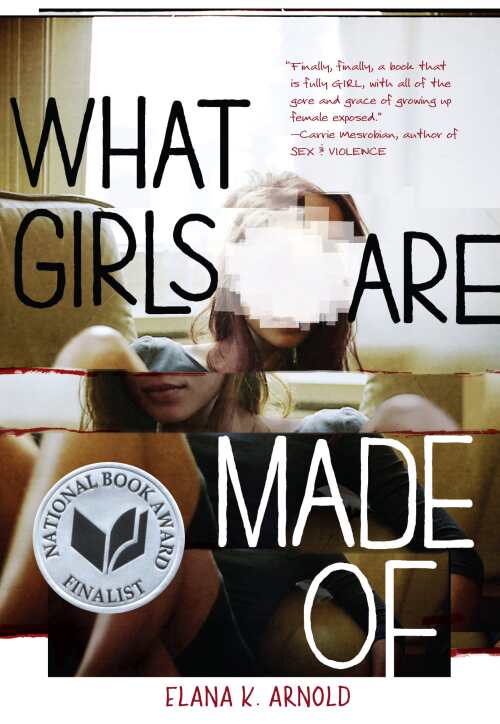All You Do is Love: Elana K. Arnold & WHAT GIRLS ARE MADE OF

What are girls made of? It’s a loaded question to be sure––one that has been answered with rhymes, riddles, and, in many cases, by privileged men behind solid desks to shield them from any consequences. Surely the answer isn’t sugar, spice, and everything nice.
What Girls Are Made Of explores the concept of love through Nina, who has been told that love has a price. Hers story is a story that needs to be told, and its candid and at times unnerving exploration of love has already earned it a finalist’s spot at the National Book Awards. I spoke with Elana K. Arnold about this achievement, as well as about expectations placed upon women and love.
Amber J. Keyser shared an anecdote about your book tour together in which a man asked you “Why would a fifty-year-old man want to read a book about a sixteen-year-old girl?” to which you responded “Why do we expect sixteen-year-old girls to read books about fifty-year-old men?” Do you have an answer to that question yourself?
If you’ve been following the news, you know about Harvey Weinstein and the allegations of systemic sexual assault. How is it possible, people are asking, that he could have abused so many women over so many years? How could he have gotten away with it?
The answer to both questions—why do we expect sixteen-year-old girls to read books about 50-year -old men, and how could Harvey Weinstein get away with decades of sexual assault—is the same. Because men, especially older white men, have power. And the people with power determine whose stories matter, whose side of the stories matter. It’s their side, their stories, that get told and retold.
How do we shift this remarkable imbalance? We insist that our stories and our side to the story matters. We insist loudly, and firmly, over and over again. We take up space, even if it makes everyone uncomfortable, including ourselves. We empower ourselves and don’t ask permission.
Your title is reminiscent of the “sugar, spice, and everything nice” rhyme; what is the importance of this when the plot of What Girls Are Made Of is far from sugary?
I think the title is significant because it acknowledges the lie we are all told about femaleness. As the reader thinks about the promised materials of girls—sugar and spice and everything nice—she can see that these are things that are meant to be consumed, to be eaten up, to bring pleasure to others. Of course, as a writer, I’m doing the same thing to Nina—I am consuming her, and I am consumed by her, at the same time. This book was not a pleasure to write. Writing this book was like reaching into my own throat and extracting a weird gross owl pellet, a mass of hair and teeth and blood and little bones, and then picking it apart, examining what it (and I) was made of.
Nina’s mother is the one to tell her the limitations of love; what are women’s roles in perpetuating these misconceptions that all love comes with conditions?
Nina’s mother is the person who puts her belief about the limitations of love into words, but every character’s actions teach Nina about love and its limitations. Her father, for instance, is never on the page and doesn’t have one line of dialogue, but I think his absence is as much a lesson about love as Nina’s mother’s chilling dictate. Women and men, alike—all of us—are complicit in what we teach and believe about love.
How can we combat the idea that women must either be pure or offer sex to gain love?
Maybe the question isn’t if we can convince women that they don’t need to be pure or offer sex to gain love; maybe better is to question if “gaining love” is a pursuit we should encourage for others or even ourselves.
My daughter once told me she wanted to be famous when she grows up. I told her, “You can’t decide to be famous. Fame is something that happens to you. You can decide to be an actor. Then, as long as you are acting—even if you never get paid, even if your only audience is your reflection in the mirror—you are an actor.” I feel the same way about love. We don’t get to choose if we are loved. We can’t make the world (or any person) love us. All we can do is love.
What was your reaction to being longlisted for the National Book Award?

Of course, I was amazed and honored that *What Girls Are Made Of *was longlisted for the National Book Award, and then named as a finalist. What surprised me was how pleased for the book I felt; with this recognition, my weird, ugly, beautiful book will get a longer life. It will have the chance to reach more readers. It will get another printing. This has been deeply gratifying in a way I couldn’t have predicted.
What is something you’d like to tell all girls like Nina, who struggle to understand love?
I don’t understand love. Love is a sort of binding magic, is the best way I can describe it. I think I’d encourage girls, boys, everyone, not to fear love. The author’s note and the end of What Girls Are Made Of has this to say about love, and I stand by these words; I try to live by them: You get this one body and this one hundred years. Love it, love it, please, love it.

Hannah Hohman is associate editor at Foreword Reviews. You can contact her at hannah@forewordreviews.com.
Hannah Hohman
